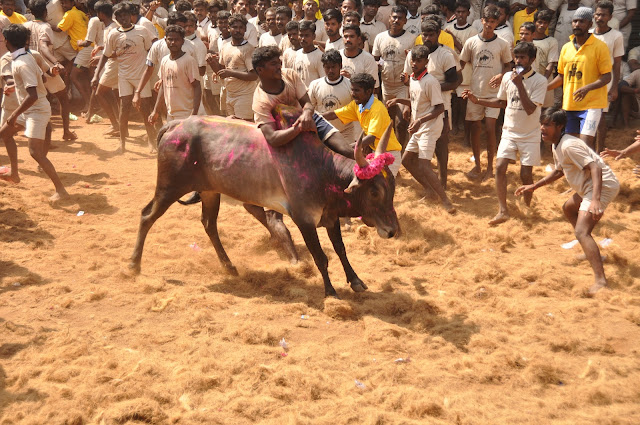Vakisan Pongal, the actual Pongal day falls on the Tamil calendar on the first day of the Tamil month Thai, usually the 14th or 15th January. Early in the morning people cook the typical dish, which is also called Pongal.
It consists of rice with fresh milk and syrup from the palm sugar of the new harvest. According to ancient tradition, it should happen in the open courtyard in a new pot at a new fireplace if possible. Big sticks of sugarcane stand next to the pongal pot. Above all, one thing is important on this day is that the food must boil over.
Everyone waits anxiously for this moment and shouts Pongal! Pongal! Later, people visits relatives and friends, presents each other with various sweets and exchanges holiday greetings. This day is the most important of the Pongal festival. On the front doors kolams were often made to celebrate the traditional harvest festival.
And we were able to experience this very day and the cooking of the Pongal live. All were dressed in traditional South Indian robes. The women and girls had a clay pot in front of them and cooked the rice. It took about 45 minutes until the first Pongal overcooked in the pot. We also tasted the pongal, the sweet dessert made from rice and spices made for this celebration.
Of course, cows can not be missed at such a festival. So two men led two cows through the crowd, which were caressed and honored. It was totally interesting to experience that. What impressed me was that oh so many young South Indians have participated in it.
The other holidays are as follows. On the third day, Mattu Pongal, cows and buffaloes are ritually thanked for their services. In some areas of Tamil Nadu, there is a competition that day. Jallikattu, also known as Manju Virattu is all about chasing the bull. For the young men, it is about taming a wild, mostly alcoholized bull with bare hands. The young men must try to recover gold coins attached to the horns of the bull.
On the last holiday, Kanum Pongal, the unmarried boys and girls gathered on the banks of the rivers in former times to choose their future ones. This custom does not exist today. However, people, especially shopkeepers, traditionally visit the beach and theme parks on this day.
At Madurai we visited the great Sri Meenakshi Temple. It has 4 big towers and in the middle of a huge basin. Long time ago the residents came to the water. But since the whole temple is holy, it is now forbidden. The temples are very colorful and have a lot of handcrafted ornaments. In one part of the area, there's a nice elephant lady giving her blessings in the name of god Ganesha.
Unfortunately there was a big protest in Madurai. The reason is that PETA wants to ban the bullfight Jallikattu. Thousands of people gathered hoping that a lifting of the ban will be pronounced very soon.
In the evening I enter a theatre to enjoy a South Indian movie cinema. The atmosphere in the room is guaranteed, as the spectators express themselves! I do not understand the language, and everything ends well in songs on kollywood choreographies that carry me with pleasure with cold drinks and popcorn in large quantities.
Outside, cows and oxen were groomed for the occasion and men painted their horns in many colors. In the evening, the procession of wrapped ox carts decorated with balloons, trucks and decorated tractors were organized. The hordes of young people gesticulate while dancing to the shouts of Happy Pongal. Huge speakers pour out loud music. Well I can tell you that the journey to the temple in oxcart is long and uncomfortable.
As it dawned and we still had a bit back, we took the car back to our accommodation. After a short stop at the hostel I go out to buy something for dinner. My choice this time was a green vegetable curry with rice. It was totally delicious.







